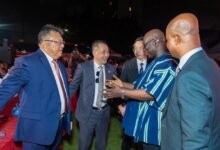
First Lady, Mrs Rebecca Akufo-Addo, has called for stringent measures to improve the country’s nutritional status to accelerate socio-economic growth.
Speaking at the inauguration of the Ghana Academy of Nutrition and Dietetics (GAND) in Accra yesterday, the First Lady observed that though “government initiatives such as the Planting for Food and Jobs (PFJ), Rearing for Food and Jobs (RFJ) among others give us hope, enough food is not a sign that everyone is nourished.
“We need to ensure quality. We must ensure we reach every Ghanaian and that no one is left behind in getting the right nutritional value. This requires a multi-sectorial approach,” she said.
GAND is a professional body that brings together qualified nutritionists and dieticians to shape the country’s nutritional landscape, and reduce malnutrition and misconceptions about some food produce among the Ghanaian public.
The association is expected to be a firm voice on matters relating to food safety and nutrition in the country while shaping national policies and interventions in that direction.
Mrs Akufo-Addo noted the timeliness of the merger of both professions into one unit, indicating that the move showed renewed efforts to change the status quo to end hunger, attain food security and improved nutrition in line with goal two of the Sustainable Development Goals (SDGs).
“This is the exact partnership needed to galvanise public change because there are lots of processed foods and unhealthy beverages in the system and we must implement actions to control the situation.”
The First Lady expressed hope that the Academy “would bring impetus in achieving inter-linked health targets in the SDGs,” pointing out that proper nutrition was critical to the country’s development and “our future depends on changing the present narrative.”
In a keynote address, Professor Francis Zotor, Council Member, International Union of Nutritional Sciences charged members to go all out in saving the country from under-nourishment and improper feeding.
To him, despite Ghana being a signatory to many treaties geared towards reducing hunger, stunting and food waste, challenges including exclusive breastfeeding, anaemia, and obesity among other health threats, persisted.
“We must not be complacent. We must hold policy makers accountable and work with them to transform the nutritional landscape.
The country’s food baseline strategy has still not been implemented and it should be worked on.”
“Sugary beverages are still on the rise on our markets and people are consuming without knowing some of the effects on the human system.
We need to increase our voices on these matters and protect the people,” he urged.
Senior Planning Analyst at the National Development Planning Commission (NDPC), Madam Mary Mpereh announced that the Commission had introduced an annual progress report on food and nutrition in the nation’s medium to long term development plans.
She noted that the lack of coordination among key sector players and partners accounted for the little progress made in improving nutrition among citizens.
He therefore urged GAND to use their platform to “influence policies, demand accountability from government and give us feedback on what we are doing right or wrong in the area.”
On his part, Dr Kingsley Pereko, interim president of GAND signalled his association’s determination to weed out charlatans in the profession and be a credible voice for promoting proper dieting among Ghanaians.
“We are what we eat. If our nutrition is good, Ghana will be good and we as a body are going to leverage on all opportunities necessary to address the country’s nutritional challenges,” he stated.
BY ABIGAIL ANNOH






